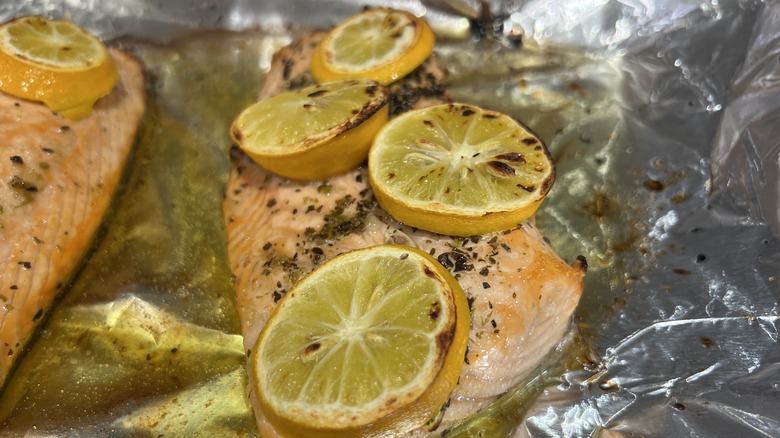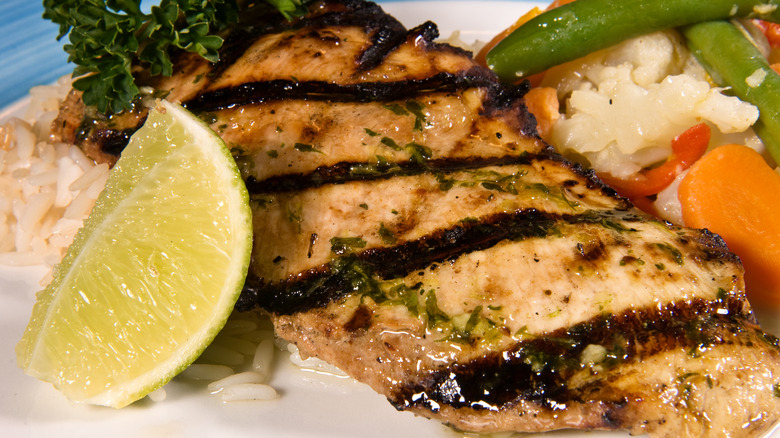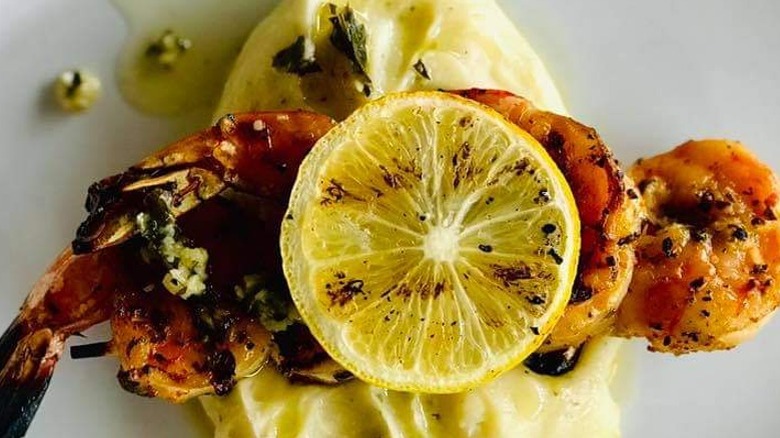Grill On Top Of Lemon Slices For Ultimate Flavor And Convenience
You've probably seen lemon slices in cooking before, especially when it comes to grilling. You may have seen a recipe for salmon where the lead photo is a plank of salmon covered in herbs and lemon slices. You may have seen chicken breasts that are grilled and topped with lemon and a spice rub. Lemon slices seem to be a good match for certain types of meat, not only giving them flavor but also giving them some attractive color. Who doesn't like some lemon pepper chicken or some salmon with fresh lemons and cucumber salad?
But while it's not uncommon to associate things like grilled chicken or grilled salmon with lemon slices, you probably never imagined grilling on top of them — and we mean that literally. Rather than grilling on tinfoil as you normally would, you instead lay down a "bed" of lemon slices large enough for the meat to be placed upon and then grill it as you usually would. This method also works very well with vegetables like asparagus or peppers, so long as they can fit on the bed of lemon slices.
But why even do something like this in the first place, you may wonder? While this is admittedly an unconventional method, grilling on a bed of lemon slices is not only a convenient method of grilling your meats or vegetables but it's also a very good way to get some much needed flavor into every part of what you're cooking.
Your food won't stick to the grill
If you've ever cooked on the grill, you can probably attest that certain foods seem to stick to the metal surface more often than not. When you grill on tinfoil, you find that the food sticks even to that, leaving you picking little metallic bits off your food before you serve it. When you grill on lemon slices, however, you avoid that problem altogether.
When you grill on a bed of lemon slices, there's no way that the food, meat or vegetable, can stick to it. Nothing can stick to a lemon's surface in the same way gristle or fat can burn and stick to tinfoil or the surface of the grill. Another benefit of this method is that, no matter what side of the meat or vegetable you're cooking on, you're always letting it absorb all of that tangy lemon flavor. When you normally grill, say, salmon with lemon, the top of the salmon is the most exposed to the lemons, unevenly distributing the flavor. You're getting most of the flavor on top when it ideally should be spread evenly all around.
Grilling on lemon slices is also a good way to circumvent cooking on any synthetic or chemical surfaces. Some people may balk at the idea of grilling on aluminum foil due to concerns about aluminum leaching into the food as it cooks. Grilling on lemons, an all-natural fruit, could be a good way to start a more natural-focused lifestyle.
You can use the grilled lemons for other recipes too
After trying this method and eating your fish or chicken, you now find yourself with a plate full of grilled lemon slices. What exactly can you do with them? Should you throw them out or should you save them for another recipe?
Should you have some grilled lemons on hand, there's a surprisingly wide variety of uses for them. Thanks to their "caramelized" richer flavor from the grilling process, which makes them sweeter and tarter, grilled lemons can be used as everything from a garnish on foods to topping off cocktails. Their deep, dark, golden-black color makes them an attractive garnish. You can also chop the lemon slices into smaller pieces and serve them in a salad, pasta, or in a salsa. You can even put the lemon slices, provided they are peeled off their rinds first, onto sandwiches or as pizza toppings. You can also squeeze the juice out of them for later use, as it will have a much richer, bolder flavor than your average bottle of lemon juice.
This means that not only are you making grilling easier for yourself, but you're also getting a much better experience than you would grilling on foil or on the surface of the grill. In fact, you may like grilling lemons so much, you'll want to make them on their own as much as possible.


